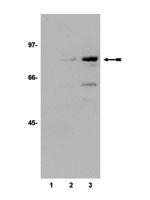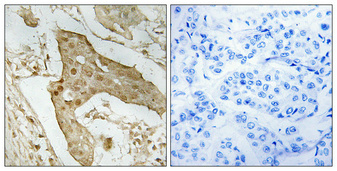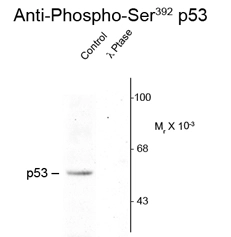
WB analysis of in vitro acetyl transferase reaction products using GTX30768 p53 (acetyl Lys373) antibody.Arrow indicates acetylated GST-p53. Lane 1 : GST-p53 alone Lane 2 : GST-p53 in the presence of PCAF Llane 3: GST-p53 in the presence of p300 Dilution : 1:1000
p53 (acetyl Lys373) antibody
GTX30768
Overview
- SupplierGeneTex
- Product Namep53 (acetyl Lys373) antibody - Orthogonal Validated
- Delivery Days Customer9
- Application Supplier NoteWB: 1:1000-1:5000. *Optimal dilutions/concentrations should be determined by the researcher.Not tested in other applications.
- ApplicationsImmunoPrecipitation, Western Blot
- CertificationResearch Use Only
- ClonalityPolyclonal
- ConjugateUnconjugated
- Gene ID7157
- Target nameTP53
- Target descriptiontumor protein p53
- Target synonymsantigen NY-CO-13; BCC7; BMFS5; cellular tumor antigen p53; LFS1; mutant tumor protein 53; P53; p53 tumor suppressor; phosphoprotein p53; transformation-related protein 53; TRP53; tumor protein 53; tumor supressor p53
- HostRabbit
- IsotypeIgG
- Protein IDP04637
- Protein NameCellular tumor antigen p53
- Scientific DescriptionThis gene encodes a tumor suppressor protein containing transcriptional activation, DNA binding, and oligomerization domains. The encoded protein responds to diverse cellular stresses to regulate expression of target genes, thereby inducing cell cycle arrest, apoptosis, senescence, DNA repair, or changes in metabolism. Mutations in this gene are associated with a variety of human cancers, including hereditary cancers such as Li-Fraumeni syndrome. Alternative splicing of this gene and the use of alternate promoters result in multiple transcript variants and isoforms. Additional isoforms have also been shown to result from the use of alternate translation initiation codons from identical transcript variants (PMIDs: 12032546, 20937277). [provided by RefSeq, Dec 2016]
- Storage Instruction-20°C or -80°C,2°C to 8°C
- UNSPSC12352203




![ICC/IF analysis of HeLa cells using GTX27757 p53 antibody [BP53-12].](https://www.genetex.com/upload/website/prouct_img/normal/GTX27757/GTX27757_20191025_AP_002_194_w_23060722_732.webp)

